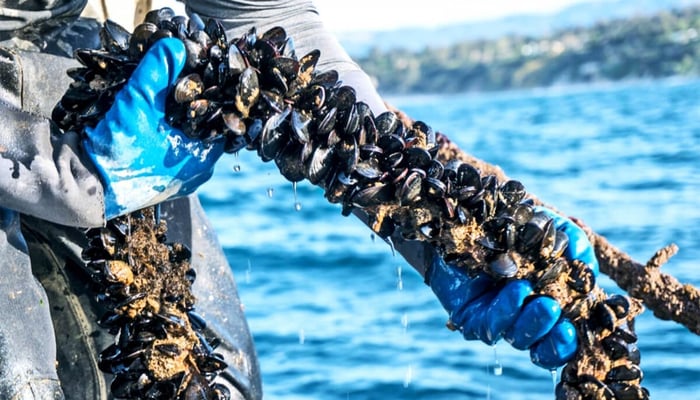Calling mussels a superfood would be selling them short. Sure, they’re delicious, nutrient-rich, low-calorie, and packed with high-quality protein, but more than anything, they’re a regenerative species that improves the health of our planet. Mussels are beyond super.
Depending on where a person lives, mussels can seem unfamiliar or even strange. So let’s take a moment to familiarize ourselves with one of the great climate cuisines of our time. A Farmer’s Delight
A Farmer’s Delight
The vast majority of mussels consumed are farm-raised, and in North America, approximately 80 percent of these mussels come from Prince Edward Island, Canada. They grow along ropes in pristine freshwater inlets, where they maintain a healthy distance from the gritty ocean floor.
Growing mussels is fairly easy in comparison to other forms of agriculture. Talk to anyone that spends time on the water and they’ll attest to the fact that mussels naturally grow along any ropes available—yes, including those where they weren’t invited.
Our oceans and waterways simply crave to produce mussels.
Mussels require zero inputs. This means that mussels require zero feed, fertilizers, or antibiotics. This is significant from both an environmental and economic perspective when recognizing the required inputs to raise a single salmon or even a head of broccoli.
Mussels don’t swim. This might seem obvious, but farming food that won’t escape is extremely advantageous, not just because it makes for an easier harvest, but because it removes the risk of potentially harming neighboring ecosystems.
Mussels clean our water. Yes, not only are mussels immune to harming their neighboring ecosystems, they do the very opposite by breathing life back into our oceans and waterways. As one of the planet’s greatest living water purifiers, mussels feed by filtering small organic particles, such as bacteria, algae, and detritus, out of the water column and expelling filtered water back into the habitat, improving water quality and promoting healthier biodiversity for surrounding species.
So why is it that there hasn’t been a larger global emphasis on farming mussels?
Ocean farming has been driven by consumer markets. When aquaculture first gained steam, the thought was, “hey, people like to eat tuna and salmon, let’s grow that.” However, those are wild palates and not always simple to farm effectively.
Looking back, the simpler and more sustainable approach would have been to explore what elements make the ocean a unique agricultural space, and ask, “what does the ocean want to grow?”
The ocean wants to grow mussels, and it’s not too late to give the ocean what it wants.
With a collective demand for more environmentally responsible diets, markets for regenerative ocean farmers that produce mussels will only increase. Organizations such as GreenWave are teaching former fishers and future farmers how to create and scale regenerative ocean farms consisting primarily of bivalves and seaweed. 
Nutritional Benefits
Naturally, this is where the “muscles build mussels” puns would begin, but in all seriousness, over 55 percent of the calories in a serving of mussels come from protein, with only about 25 percent coming from fat. Additionally, mussels are a rich source of vitamins and minerals such as iron, vitamin-B12, vitamin-C, potassium, and calcium.
So while mussels may often serve as an appetizer, there is good reason to utilize these nutritional powerhouses as the primary source of protein in a meal.
Cooking Mussels
Mussels are simple to cook but might seem intimidating at first. De-bearding, purging, and scrubbing may seem like tedious tasks that could easily go wrong—fortunately, that’s not exactly the case. The most important aspect when it comes to cooking and eating mussels is being able to identify if a mussel is safe to eat, and that’s an easy task. If a mussel has a broken shell or won’t fully shut when rinsing, discard it. Similarly, if a mussel doesn’t open when the batch is cooked, discard it. Fresh, high-quality mussels will have few, if any, discards in a batch.
Canning Mussels
If cooking still seems daunting, you don’t have the time, or your local seafood counter doesn’t have high quality mussels, there's a whole world of canned mussels dotted in elegance. Canned mussels have a storied history in Spain, and as of recent are beginning to gain popularity in the likes of Canada, Denmark, Chile, the United States, and the UK.
It is important to recognize that mussels aren’t canned out of necessity. There’s a common misconception that canned mussels are inferior to fresh mussels when often the opposite is true. In Galicia, Spain, where a great deal of the world’s premium canned mussels are produced, mussels are so abundant, to the point that eating fresh mussels is a part of daily life. The canned varieties, however, are often seen as a superior product, similar to how cured meats gain value over time. These tins will often be popped open on special occasions and celebrations.
Canning allows the mussels to take on a more tender texture and absorb the flavours with which they are canned. In Spain, the primary method is preserving mussels in an escabeche composed of olive oil, vinegar, and warm spices, whereas when you travel around the globe you’ll find new brands using native flavours to their region. For example, Scout preserves its local PEI mussels in a smoked fennel and paprika tomato sauce, Fangst goes for a Nordic profile with a blend of cold rapeseed oil and dill seeds, and East London Canning Co. utilizes a local Somerset cider marinade—each brand sparking its own unique personality.
Canned mussels may serve as the perfect option for adding protein to a pasta dish, new flavours to a charcuterie board, or as a quick snack on the go, but they’re also one of the most responsible food options available. It’s understood that mussels are a regenerative species, but by preserving them in 100 percent recyclable aluminum cans, it can be ensured that each tin carries an extended shelf life, meaning that these prized water purifying, nutritional powerhouses can avoid ever going to waste.
Most importantly, canning mussels allows us to collectively eat more mussels.
At Scout, we encourage you to learn where your mussels come from, here’s where ours are from.




